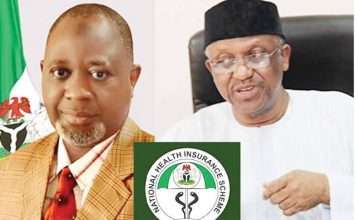During a webinar commemorating TheCable’s 10-year milestone, Prof. Muhammad Pate, the Coordinating Minister of Health and Social Welfare, voiced his apprehensions regarding the exorbitant costs of healthcare in Nigeria.
He highlighted that medical care, particularly for long-term illnesses such as cancer, is exacerbating poverty levels among Nigerians.
Pate stressed the urgency of implementing comprehensive health insurance reforms to alleviate the economic strain on individuals and families, underscoring the critical importance of ensuring affordable and high-quality healthcare services for all citizens.
He emphasized that “Addressing escalating costs of medicines ,” and that less than 10% of Nigerians currently have health insurance coverage. Therefore, he called for immediate action to facilitate access to affordable healthcare for all Nigerians.
“The financing of healthcare in Nigeria and its affordability has been a long-standing issue for more than 40 years. Less than 10 per cent of Nigerians have insurance, which means most of our financing for health care is out-of-pocket. Hence, when prices go up, the medically related, impoverishment due to the cost of medical care also goes up. Nigerians get thrown into poverty.
“Many of us are a few steps away from poverty because of care. If you have catastrophic illnesses like cancer or kidney failure, it’s easy because we don’t have a viable insurance platform and this is not today. This has been decades in the making to get to where we are today in terms of health insurance,” he stated.
He highlighted, “On the demand side, a massive effort is underway on reforming the health insurance landscape. We believe that if we can expand the health insurance landscape and have millions of Nigerians covered, then the ability of the system to pay for some of the costs of medicines, diagnostics and medical care will not be borne by individuals and households, but by a third party.
“The absence of a third-party payer contributes significantly to the strain individuals feel due to escalating prices. With an organized buyer in place, negotiation of prices and quality assurance become possible. This would ideally result in individuals only needing to make a co-payment or having medications readily available at the point of use.”
The minister, however, attributed the increasing cost of medications to factors such as foreign exchange devaluation and unstable power supply.
While recognizing that the surging cost of drugs is a global issue, he emphasized the necessity for cooperation between the government and private sector to implement effective remedies.
He highlighted the government’s initiatives to combat the affordability crisis in healthcare sector, including endeavors to unlock the healthcare value chain and boost local production of essential pharmaceuticals.
Pate also outlined measures to enhance the regulatory framework to ensure the availability of high-quality medicines and prevent the circulation of counterfeit and substandard products.
He emphasized the significance of price regulation and improving the supply chain to safeguard consumers and foster market sustainability for legitimate producers.
The minister emphasized the significance of making informed decisions regarding healthcare choices.
“harder way of industrialisation”, which may be tough in the short term but promises long-term benefits for the country’s economy and public health.
He emphasized, “All in all, we are not unmindful of this challenge Nigerians are facing, just as we are facing a food crisis. There is a rise in food prices and that of other products that we don’t manufacture at home. Pharmaceutical prices also have escalated in cost over the last year or so. But is this a transitionary crisis? Nigeria is digging its way out of that.
“And I believe that in the next year or two, we’ll see things stabilise and that inflation that has gone up is likely to begin to stabilise and be under control.
“And as we industrialise, hopefully, we will mitigate against continued dependency on imports of critical life-saving commodities and even for the more expensive ones, the so rarely used oncological products. Hopefully, we can be able to have measures put in place to reduce the burden on Nigerians over time.
“There are two ways; the easy way and the hard way. I think we chose the easy way decades ago. The easy way is the harder way, while the hard way is the easier way.
“In the long run, we are now choosing the harder way, which is to industrialise. It’s tough but has to be done. And the industry is with us and we in the government, under the president’s leadership, are committed to ensuring that we pull through this harder way.”
